President Obama made important points in his recent speech on national security but none more important than this: “This war,” he said, referring to the armed conflict that began 12 years ago in the wake of 9/11, “like all wars, must end. That’s what history advises. That’s what our democracy demands.”
An American president has finally called for an exit strategy from the war that has led to human rights abuses and compromised the international standing of the United States. In so doing, he rejected the view of Defense Department official Michael Sheehan who recently testified that the war would last “at least” another 10 to 20 years.
Obama also opposed the efforts of those in Congress to expand the 2001 Authorization for the Use of Military Force (AUMF) to a wider range of terrorist groups with no connection to the 9/11 attacks. “Not every collection of thugs that labels themselves al Qaeda will pose a credible threat to the United States,” he said.
During the upcoming debate over the annual defense authorization bill, some in Congress may take the president’s offer to “refine” the law on military force as an invitation to expand its scope. If this happens, the president will need to fulfill the pledge he made in the speech: “I will not sign laws designed to expand this mandate further.”
In keeping with his goal of ending the war, Obama outlined steps he would take to reduce the number of prisoners at Gitmo. The president has blamed Congress for stymieing his efforts to close the facility, but the speech acknowledged that he has authority he has not yet used to send prisoners home or to third countries. Crucially, he will lift the self-imposed ban on sending prisoners back to Yemen, the home country of more than half of the 86 detainees cleared for transfer.
Obama’s pledge to appoint officials in the State and Defense Department to oversee transfers is a welcome move. But we know from experience that ongoing, high-level engagement from the White House is essential to avoid the inter-agency game of hot-potato that closing Gitmo has become. Prisoners have been hunger striking for more than 100 days, and some have been locked up without charge or trial for more than a decade. The president needs someone in the White House charged with driving this forward.
Under Obama, the primary weapon of war has been the drone, and he used the speech to make the case that the targeted killing program is in line with U.S. and international law. He laid out impressively strict criteria for launching a strike against Americans and non-Americans alike.
However, neither the speech nor the accompanying fact-sheet adequately defined who can be legally targeted or explained the system of internal review. Without it, Americans—and the rest of the world—will continue to question whether the targeted killing program is on firm legal ground.
And in the name of transparency, Obama should also release the Senate Intelligence Committee’s investigative report into the CIA’s post-9/11 interrogation program, which he didn’t even mention in his speech. Early in this long war, our government made the fateful choice to inflict cruelty on prisoners—a choice that damaged not only its direct victims but also our nation, whose system of laws, moral standing, and national security suffered grievously as result.
To his credit, Obama banned abusive interrogations. But absent a full public reckoning, the wound left by the torture era will continue to fester. The Senate report is the authoritative record of this dark chapter. Americans deserve to see it, and Obama should not let the CIA prevent its declassification and release.
Ultimately, the full significance of the speech will depend on what happens now. The speech is a sign that the president felt a need to respond to those of us calling for a counterterrorism approach fully grounded in American ideals.
My organization will soon bring to Washington some of the nation’s most respected retired generals and admirals. Some of them were standing behind the president in the Oval Office when he pledged to close Gitmo in 2009. Four years later, they’ll press him to make good on that promise, release the Senate’s torture report, and reveal more information about the targeted killing program.
They’ll also politely remind him about how his actions on Guantanamo Bay could reflect on his legacy. Perhaps the president is already taking this into consideration when he said “history will cast a harsh judgment on this aspect of our fight against terrorism, and those of us who fail to end it.”
